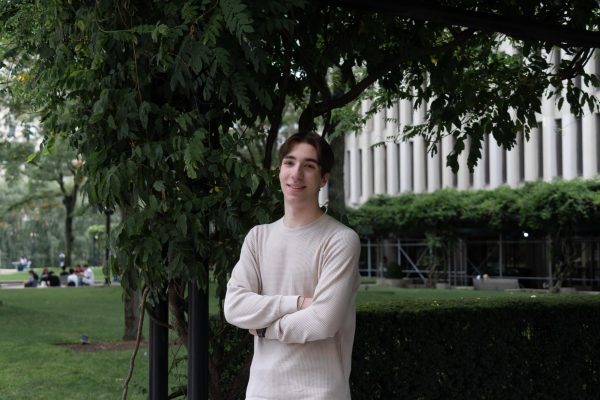My daily commute consists of an hour-long ride into Manhattan across two different trains. It is exceedingly rare to find anyone engaging in direct communication with one another. Some read a book. One or two talk over the phone. Most simply sit in silence. I often find myself drifting toward sleep. In short, everyone attempts to furnish the train rather than actively occupy it as individuals. Everyone is attempting to become unnoticeable.
This scene is a far cry from the vitality of so much of our media, art, music and dreams. The conscious, active disengagement I see on the train feels completely contrary to the connection we strive to achieve with others. A Statista survey found almost 60 million American users on dating apps in 2023, with the number of users increasing each year since 2018. In the wake of these struggles, a redefinition of love can prove tremendously fruitful in paving the way for far more and far deeper connections.
The primary goal of such a redefinition is to alleviate the burden of public presentation. I find Jeremy Bentham’s panopticon provides a tangible visual for this burden. Bentham’s panopticon is a model for a prison where a single guard within a solitary watchtower could survey an entire prison population. Consequently, each prisoner would be unable to tell when they were being observed. Each must therefore constantly police themselves, for they could be seen at any moment. Each occupant becomes their own imposing enforcer.
Nevertheless, we still strive for a genuine connection, where we are seen and valued without feeling the need to perform according to another’s expectations.
I find — and I would wager that others do too — that I act in ways similar to Bentham’s prisoners. The notion of constriction arising from within rather than an external judgment is deeply unsettling. It is the internalization of external conventions and their subsequent usurping of our beliefs that can minimize our individual agency. I believe that we often behave with more respect for how others may perceive us, rather than acting in accordance with what we personally want. We become passengers in our own experience, as another, the internalized other, takes the wheel of our vehicular existence. We go in the directions they take us rather than our own desired destinations.
Love has much to offer in counterbalancing this propensity. This internal other wields an enormous amount of power over us. Each moment of our lives gains another dimension of worry from the sheer possibility of being observed by another. Outside expectations are always playing a role in our lives; it may only be a matter of degree. Nevertheless, we still strive for a genuine connection, where we are seen and valued without feeling the need to perform according to another’s expectations. This tension between striving for connection and worrying over judgment compounds the already inconsistent manner in which we live our lives.
Reality is tragically unstable. The only constant of life is perpetual change. Cultivating a unified sense of self-identity is hardly possible. Any sweeping statements about ourselves will by definition struggle to encompass the complete beings that we are. Even more pressing is the question of how another person may gain a full image of you.
We still exist in the fragmentary state Michel de Montaigne described nearly five centuries ago: “not only does the wind of chance events shake me about as it lists, but I also shake and disturb myself by the instability of my stance: anyone who turns his prime attention on to himself will hardly ever find himself in the same state twice.”
A recentering of love and self-expression can provide the saving grace from the turbulence of life and the omnipresent potential of judgment that lies within. I envision a love focused precisely on the preservation of personal boundaries between each unique soul involved. Love is marked by basking in an individual’s glory, not a judgment of their perceived shortcomings or contradictions. Love should be molded and shaped anew with each new relationship, reacting to the individuals rather than imposing upon them.
Love is redefinition without end; it is as fluid as the individuals constructing it. A relationship cannot remain stagnant given the constant change undergone by each person throughout their lives. A precise articulation of love must not become idealized. To idealize love reverses its dependence on the beings creating it, forcing the participants to conform to a narrow dogma rather than continually expanding as only they see fit.
Loving relationships allow for the space to share the emotions and thoughts we so often bury to avoid discovery by others.
Rather than consisting of mere concessions and a diminishing of personal agency, close relationships can form a veiled sanctuary, sparing participants from the imposing gaze of others. These close relationships — platonic and otherwise — can achieve so much in their intimacy. They present nearly the fullest experience of feeling and awareness of how astonishingly complex every individual truly is.
The primary example of such closeness lies in intimate conversation. By intimate, I refer to a conversation that discloses information that is shared with a select few. It is confessional and necessarily vulnerable. Loving relationships allow for the space to share the emotions and thoughts we so often bury to avoid discovery by others. Importantly, I posit that these conversations should not take the form of a didactic correction, but rather a comforting space for processing and sharing. One does not attempt to impose and solve the other’s problem for them unprompted; instead, one allows and recognizes the vulnerability the other displays through the caring act of listening.
Another motivator for this view of love is the possibility of desiring more genuinely or, at the very least, a heightened awareness of how our desires develop. As feminist thinker Amia Srinivasan wrote in her noteworthy essay “Does anyone have the right to sex?” we must “acknowledge that no one is obliged to desire anyone else, that no one has the right to be desired, but also that who is desired and who isn’t is a political question often answered by more general patterns of domination and exclusion.” The latter stipulation is particularly eye-opening. A more blossoming form of love comes about from an embracing of the whole person, as opposed to a reduction to only the sum of their parts. It is a love that witnesses rather than analyzes.
While I recognize it is difficult to imagine love eventually achieving complete separation from politics and social convention, I do not believe that striving for such a thing is fruitless. There is so much beauty and fulfillment to be gained in approaching others as irreplaceably unique persons. Namely, it is through accepting and loving others simply as they are that we may do so for ourselves in the same manner. I do not love my neighbor as I love myself; I love my neighbor so that I can.
In considering how to capture the unique wholeness of every human being, Russian philosopher and literary theorist Mikhail Bakhtin wrote “only love is capable of holding and making fast all this multiformity and diversity, without losing and dissipating it, without leaving behind a mere skeleton of basic lines and sense-moments.” I believe Bakhtin refers to a view of love similar to my own. Love should not come with pre-requisites for our own ephemeral satisfaction. Likewise, self-love should not be stipulated on archetypes we must reshape ourselves to align with, for we would forgo the appreciation that is to be found in our own unique place in the world. We must love and receive each other as if nothing else matters.
In a world where we are so constantly aware of how we may be seen and judged, I wish for love to serve as a reprieve. As vulnerable as this image may be, the potential precarity should be embraced, not shunned. It is only through the unlocking of our doors and the opening of our windows that another may see us in an unfiltered, uninhibited fashion. We may be approached in our wholeness. We may not only become noticeable; we can be truly noticed.



